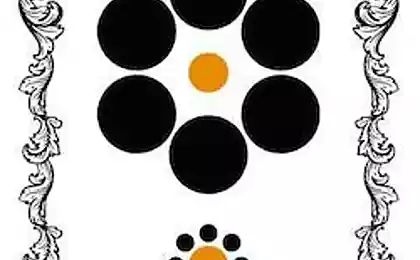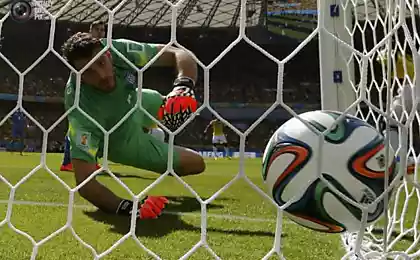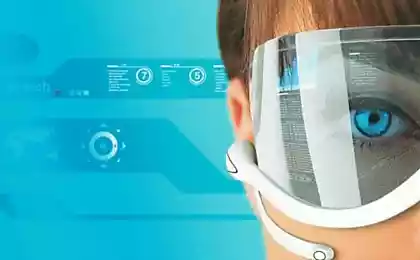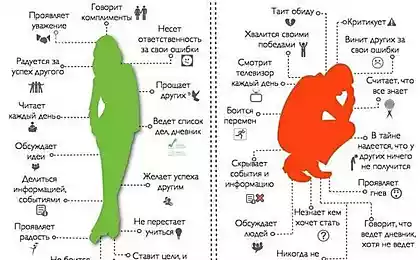682
Scientists have created the illusion of increased world
Neuroscientists have caused the volunteers a sense of body size, like the heroine of a fairy tale Carroll, who ate a magic pie. During the experiment, it was found out that the effect of such a change is not around as expected.
Researchers at the Karolinska Institute (Karolinska Institutet) in Sweden, asked volunteers to lie down and put on a virtual reality headset. Next to the subjects placed a mannequin, on which was set a couple of cameras who have displayed three-dimensional image in the human eye. Lying looked down and saw his feet instead of his plaster cast.
The effect of substitution of fixed with a pair of chopsticks, which the experimenter simultaneously touched the feet of man (that a volunteer could not see), and to the same point at the foot of the dummy (this subject observed in their glasses-screens).
The combination of visual and tactile deception is critical to the success of the experiment. Below shows the situation through the eyes of an experimental (photo B. van der Hoort et al. / PLoS One).
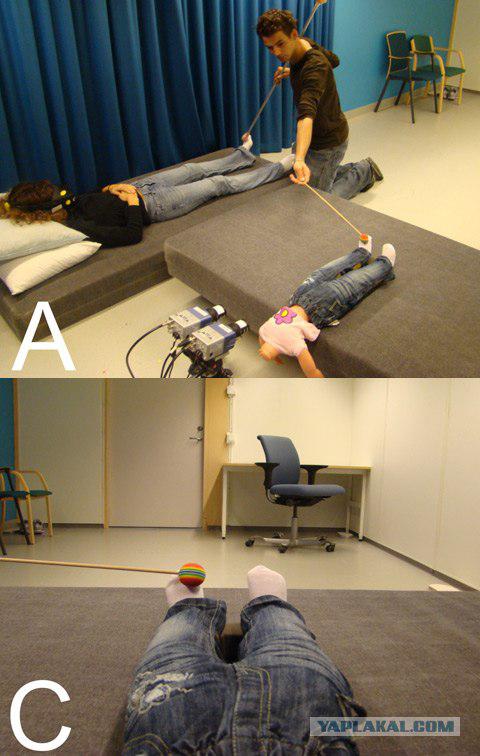
Psychological deception was a continuation of experiments "out of body" and especially - spectacular "exchange of bodies" with mannequins and even people (recent experiments also conducted at the Karolinska Institute).
We recall when it was shown that our sense of being inside his body is strongly dependent on interpretation unconscious input signals - visual and tactile - and may be deceived by technical means.
This time, the researchers confirmed for the beginning of a wonderful effect - the generation of sensations as a dummy body. So if the scientist spent the doll's leg with a knife, then the subject covered.
And then the authors have gone much further. Without explaining anything to volunteers, the organizers of experience dummy substitute source of normal size at a reduced or increased.
In the arsenal of the team had several plaster casts and dolls representing figures of 4 meters, 80 and 30 centimeters. Man watching his tiny or giant feet, plus the situation around, could feel themselves constricted or sprawled like Alice in Wonderland. But, as scientists have told in the press release of the Institute, everything was much more curious.
Total has been involved in the experience of the four dummy (Photo B. van der Hoort et al. / PLoS One).
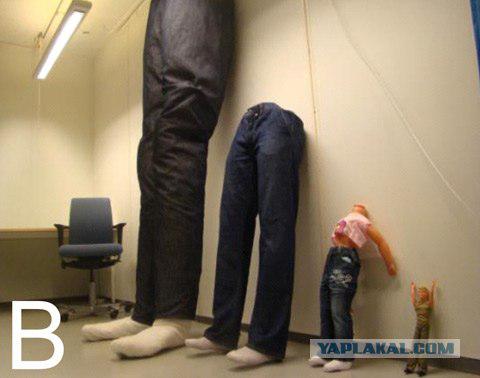
Volunteers (and there have been 198, it said Science) thought that the world has changed around the usual scale.
Depending on the size of the legs of the dummy room was tiny or huge, and enters the field of view of cameras people presented giants or dwarfs. So the result of more experience consistent feelings of Gulliver, who visited first in Lilliput, and later in the land of giants.
In this embodiment, a volunteer experience is not so much felt the size of a doll, how many reasoned that the whole world around fabulously rose. Some subjects, however, reported "disorientation" (photo by B. van der Hoort et al. / PLoS One).
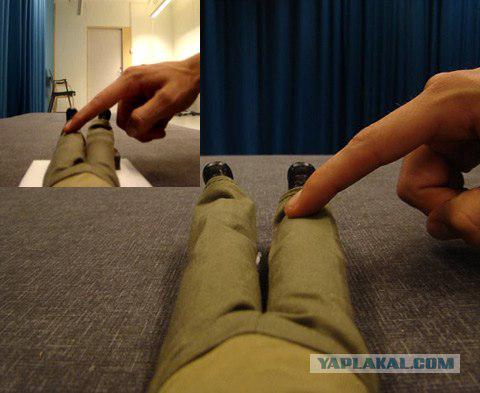
The psychological effect was very strong. "While we know what is the size of people, the illusion of forced us to think of them as giant, this is a very strange experience," - says Dr. Ehrsson Henrik (H. Henrik Ehrsson), one of the authors of a new experiment, experienced attraction "I - Barbie doll" on Me.
Another experimenter, Bjorn van der Hoort (Björn van der Hoort), said that the illusion is similar to the strange feelings that arise when you find their toys from my childhood and realize that they are much smaller than you remember.
The above trick authors provernuli not for fun. They checked how our brain interprets the size and distance of the outside world.
It is believed that the correct orientation by a variety of visual cues, such as the size of the object on the retina and its movement across the visual field. But there is also the assumption that no less important (and maybe more) is the size of the body that serves a kind of dipstick.
This hypothesis was brilliantly confirmed. Scientists are hung in front of cameras of different size cubes and asked volunteers to assess their size, using words or size of pointing gesture.
It turned out that if the legs of the dummy that people perceive as their own, were small, the volunteers overestimated the size of the cube, if the legs were gigantic, the diameter of the cube significantly underestimated (approximately 40%).
The authors of the experiment (left to right): Arvid Guterstam (Arvid Guterstam), Henrik Dr. Ehrsson and Björn van der Hoort (photo Staffan Larsson / Henrik Ehrsson).
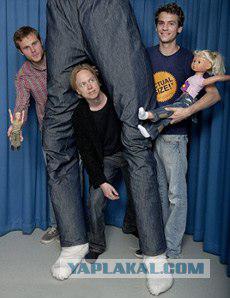
Next, the scientists tested the resistance of the illusion. While the man was lying, the experimenters pointed it at an object which is in the field of view (say, a chair, or all the same cube, hanging on a string) and asked to remember how far it is. Then he was forced to stand with their eyes closed to approach this subject
Those who experience while watching on the screens in the glasses legs a little dummy, then went too far to the selected object. Instead, volunteers who psychologists slipped enormously long "legs Gulliver", later made too few steps blindly wanting to reach the set point.
"It turns out, the size of the body affect the way we perceive the world" - the scientists conclude. (Full details of the experiment can be found in an article in PLoS ONE.)
Unusual experience has shown that it is possible to create a strong illusion of movement in the human body size is significantly different from the present. And this, according to the researchers, it may be useful to remote control robot - like giant machines and droids microscopic size.
First, for example, can act as a weapon on the battlefield or as a rescue system in the disaster areas, and the second - the rails inside the human body to perform a medical examination or surgery.
Tests to assess the size of the object and the distance to it (photo B. van der Hoort et al. / PLoS One).
In further experiments, Bjorn is going to continue to study the illusion of moving to a new body. He plans to use brain scans to see how he reacts if his body is very small or large.
Neuroscientist suggests that part of the brain that perceive visual stimuli and a position in space, will be active at a time when people try to figure out how to adapt to the new "own" size.
Material diligently copied here: www.membrana.ru/particle/16208
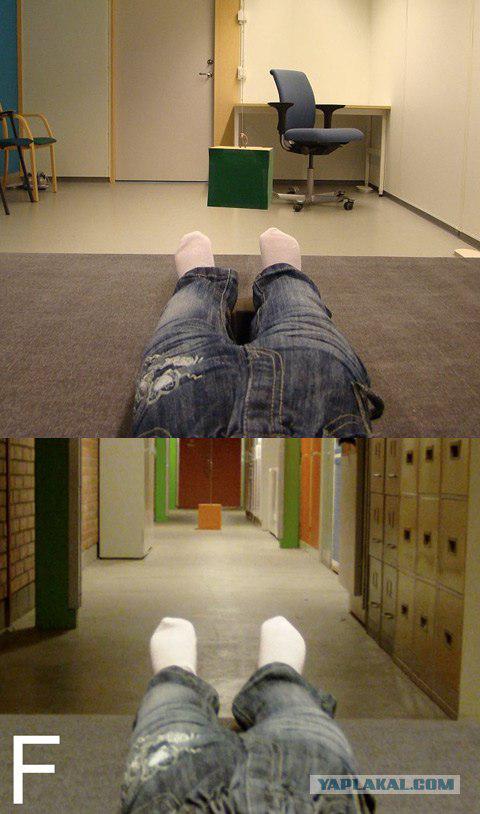
Source:
Researchers at the Karolinska Institute (Karolinska Institutet) in Sweden, asked volunteers to lie down and put on a virtual reality headset. Next to the subjects placed a mannequin, on which was set a couple of cameras who have displayed three-dimensional image in the human eye. Lying looked down and saw his feet instead of his plaster cast.
The effect of substitution of fixed with a pair of chopsticks, which the experimenter simultaneously touched the feet of man (that a volunteer could not see), and to the same point at the foot of the dummy (this subject observed in their glasses-screens).
The combination of visual and tactile deception is critical to the success of the experiment. Below shows the situation through the eyes of an experimental (photo B. van der Hoort et al. / PLoS One).

Psychological deception was a continuation of experiments "out of body" and especially - spectacular "exchange of bodies" with mannequins and even people (recent experiments also conducted at the Karolinska Institute).
We recall when it was shown that our sense of being inside his body is strongly dependent on interpretation unconscious input signals - visual and tactile - and may be deceived by technical means.
This time, the researchers confirmed for the beginning of a wonderful effect - the generation of sensations as a dummy body. So if the scientist spent the doll's leg with a knife, then the subject covered.
And then the authors have gone much further. Without explaining anything to volunteers, the organizers of experience dummy substitute source of normal size at a reduced or increased.
In the arsenal of the team had several plaster casts and dolls representing figures of 4 meters, 80 and 30 centimeters. Man watching his tiny or giant feet, plus the situation around, could feel themselves constricted or sprawled like Alice in Wonderland. But, as scientists have told in the press release of the Institute, everything was much more curious.
Total has been involved in the experience of the four dummy (Photo B. van der Hoort et al. / PLoS One).

Volunteers (and there have been 198, it said Science) thought that the world has changed around the usual scale.
Depending on the size of the legs of the dummy room was tiny or huge, and enters the field of view of cameras people presented giants or dwarfs. So the result of more experience consistent feelings of Gulliver, who visited first in Lilliput, and later in the land of giants.
In this embodiment, a volunteer experience is not so much felt the size of a doll, how many reasoned that the whole world around fabulously rose. Some subjects, however, reported "disorientation" (photo by B. van der Hoort et al. / PLoS One).

The psychological effect was very strong. "While we know what is the size of people, the illusion of forced us to think of them as giant, this is a very strange experience," - says Dr. Ehrsson Henrik (H. Henrik Ehrsson), one of the authors of a new experiment, experienced attraction "I - Barbie doll" on Me.
Another experimenter, Bjorn van der Hoort (Björn van der Hoort), said that the illusion is similar to the strange feelings that arise when you find their toys from my childhood and realize that they are much smaller than you remember.
The above trick authors provernuli not for fun. They checked how our brain interprets the size and distance of the outside world.
It is believed that the correct orientation by a variety of visual cues, such as the size of the object on the retina and its movement across the visual field. But there is also the assumption that no less important (and maybe more) is the size of the body that serves a kind of dipstick.
This hypothesis was brilliantly confirmed. Scientists are hung in front of cameras of different size cubes and asked volunteers to assess their size, using words or size of pointing gesture.
It turned out that if the legs of the dummy that people perceive as their own, were small, the volunteers overestimated the size of the cube, if the legs were gigantic, the diameter of the cube significantly underestimated (approximately 40%).
The authors of the experiment (left to right): Arvid Guterstam (Arvid Guterstam), Henrik Dr. Ehrsson and Björn van der Hoort (photo Staffan Larsson / Henrik Ehrsson).

Next, the scientists tested the resistance of the illusion. While the man was lying, the experimenters pointed it at an object which is in the field of view (say, a chair, or all the same cube, hanging on a string) and asked to remember how far it is. Then he was forced to stand with their eyes closed to approach this subject
Those who experience while watching on the screens in the glasses legs a little dummy, then went too far to the selected object. Instead, volunteers who psychologists slipped enormously long "legs Gulliver", later made too few steps blindly wanting to reach the set point.
"It turns out, the size of the body affect the way we perceive the world" - the scientists conclude. (Full details of the experiment can be found in an article in PLoS ONE.)
Unusual experience has shown that it is possible to create a strong illusion of movement in the human body size is significantly different from the present. And this, according to the researchers, it may be useful to remote control robot - like giant machines and droids microscopic size.
First, for example, can act as a weapon on the battlefield or as a rescue system in the disaster areas, and the second - the rails inside the human body to perform a medical examination or surgery.
Tests to assess the size of the object and the distance to it (photo B. van der Hoort et al. / PLoS One).
In further experiments, Bjorn is going to continue to study the illusion of moving to a new body. He plans to use brain scans to see how he reacts if his body is very small or large.
Neuroscientist suggests that part of the brain that perceive visual stimuli and a position in space, will be active at a time when people try to figure out how to adapt to the new "own" size.
Material diligently copied here: www.membrana.ru/particle/16208

Source:
